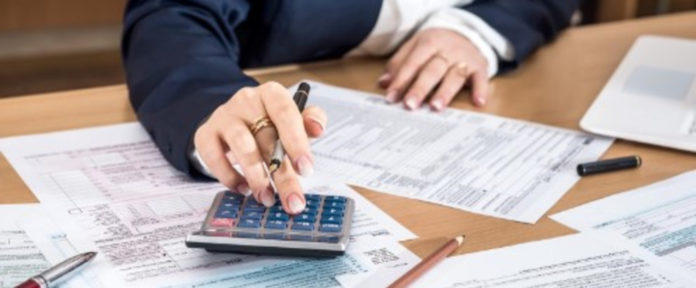For many, it’s easier to shove the paperwork to the back of the closet and try to forget about them for another year!
If you don’t file your taxes, the government can take action against you. They’ll threaten you with things like tax liens and prison time. You don’t want that to happen, so the best thing to do is file your taxes as soon as possible.
If you’re wondering just how to handle unfiled taxes, you might be wondering what steps you need to take. Follow these tips, and you’ll be fantastic. Keep reading!
Gather Your Financial Documents

It is essential to gather your financial documents to handle your taxes. It will also help to have a tax calculator handy to ensure accuracy. Check for the past years of records you need to file taxes for. This may include:
- income statements
- employee documents
- bank account statements
- loan documents
- pay stubs
- investment statements
- tax forms
Make sure to organize the documents you receive to make it easy to locate them when it’s time to complete your taxes. Go through your files and make sure that they are complete.
Determine The Outstanding Years
Taxpayers should be aware of their general filing taxes obligations and assess which years they have not filed taxes for. A few tips to help determine outstanding years of unfiled taxes are to look through any remaining documents you have from past years. This includes reviewing tax documents from pre-prepared tax filing services, financial institutions, and banks.
You can speak to your financial advisors or financial institution representatives to gain insight into the years and types of taxes you need to file. If all else fails, you can contact the IRS directly and ask for your transcripts which provide a detailed listing of all federal taxes you’ve filed for past years.
Understand The Deadlines
It is recommended to file taxes by the April 15th deadline each year and decide whether to amend past returns as soon as possible. Avoid waiting until the last minute to file taxes, as this can add stress and increase the chances of making errors. When filing unfiled past taxes, review the tax season deadlines to ensure the appropriate information is received.
Late filing penalties for unfiled taxes can vary depending on when it is submitted and how much is owed. It is also essential to pay attention to the state-specific deadlines, as many states have a long tax season.
Seek Professional Assistance
Professional tax preparers are experienced with the tax rules and can help you pinpoint any potential errors or missed deductions that can help maximize your refund. They can provide advice and tips for reducing future tax liabilities. A professional tax preparer can make the whole process smoother and more accessible.
They can help you alleviate stress by ensuring everything is done right and on time, so you can have peace of mind while preparing for the upcoming tax season.
File Your Taxes As Soon As Possible

Filing your taxes as soon as possible is one of the most important tips to remember when handling your unfiled taxes. It is essential to ensure that you file your taxes before the deadline, or you may be penalized. Using some software to help you keep track of your taxes is also a good idea. Not only does this make filing more accessible, but it also allows you to ensure all of your information is accurate.
Filing taxes can be a timely and frustrating affair. File your taxes as soon as possible. This will help ensure you take advantage of filing by the due date. Be aware of late filing penalties and fees that may apply if you don’t submit your taxes on time.
Doing so helps you be prepared for any consequences you may incur for not filing promptly. Following these steps can help make filing your taxes a bit smoother.
Use Tax Software Or Online Platforms
When filing your taxes, you may find that you have unfiled taxes. If this is the case, one of the best ways to handle this situation is to use tax software or online platforms. Tax software or online platforms can help you file your taxes quickly and easily.
You can access the IRS’s tax forms, and many online platforms also assist in completing the states. The media are secure, and your personal information is protected. It is also essential to review your filing documents carefully and to accurately report all the numbers on the forms.
Request Missing Tax Documents
If you have missing tax documents and haven’t filed your taxes on time, there are a few tips to minimize the hassle. Femain organizes and makes a list of copies that you need to obtain. Look at your last filed return to identify what types of information are required.
To handle your unfiled taxes, the first thing you should do is click for unfiled tax returns here. This allows you to access all of your filed and unfiled taxes. Once you access your unfiled taxes, you can thoroughly assess what is missing, incorrect, or updated.
File Amended Returns If Needed
If your unfiled taxes have been overlooked for some time, it may be necessary to file amended returns. This can often happen if your financial circumstances change or you want to claim deductions or credits you didn’t initially report. It’s essential to ensure that all changes are accurate and up-to-date, so it’s a good idea to consult an accountant or financial adviser before filing your amended return.
Additionally, You should use the correct form for your filing, as incorrect conditions can lead to additional confusion or delays. Furthermore, you should know that filing amended returns may require you to pay different amounts due or receive a refund.
Once you’re confident in your amended return, keep your return paperwork in a safe place for at least seven years.
Address Any Tax Debt
The first tip for handling unfiled taxes is to address any tax debt owed. It is essential to document all past taxes every year and remain current on filing taxes. If you cannot fully pay any taxes due, it is best to set up a payment plan with the IRS or consult a tax professional to negotiate a settlement.
It is also helpful to create a timeline of due dates for filing taxes, especially for the current year, to help avoid overdue payments. Knowing fees and penalty rates for late payment and filing can also help to prevent future consequences when filing taxes.
It is essential to take action immediately and to stay up to date on filing all taxes, paying the minimum owed, and regularly consulting a tax professional when necessary.
Consider Penalties And Interest
It is essential to consider penalties and interest when handling your unfiled taxes. Taxpayers who fail to file their taxes can be charged with a fine for their unpaid taxes for each month the taxes remain unpaid. In addition, the IRS will typically charge interest on any due taxes.
It is important to remember that once the taxes are filed, the IRS will cease to charge penalties and interest. To avoid costly tax issues, taxpayers should file their taxes by the filing deadline and maintain records of their filing. Taxpayers should research any options for filing in prior years and speak to a qualified accountant if they need more guidance.
Making payment arrangements with the IRS should also be considered if possible. Taking swift action will ensure that penalties and interest charges are minimized as much as possible.
Organize Your Records

Organizing your records is one of your best tips for handling unfiled taxes. Gather any documents or information about your income and deductions from the past tax year. Keeping everything you need in one place will help you quickly access relevant documents and complete your returns accurately.
It is also important to keep financial records for multiple years. This will reduce the paperwork you need to keep organized and help you spot any errors or discrepancies if you are ever audited. Finally, store documents in a safe and secure location, such as a lockbox, fire-proof safe, or filing cabinet.
Securely storing your records can give you peace of mind and protect you against theft or damage. You can then use these records to quickly and accurately prepare your returns when it’s time to file.
Be Proactive With Future Filings
Being proactive with future filings can save an individual from filing their taxes late or risking receiving penalties. Here are some tips to ensure you handle your unfiled taxes. First, review your federal and state income tax returns to determine if you need to file any outstanding returns.
Secondly, contact the IRS and request an extension if you need more time to gather records. Thirdly, pay any taxes owed to the IRS or state with your extension form. Fourth, keep track of all documents related to filing taxes for the current and prior years. Finally, meet with a tax professional or software to help you manage your taxes and ensure that all returns are timely and accurately filed.
By following these tips, individuals can be proactive with their future filings and ensure their unfiled taxes are effectively and timely handled.
Don’t Hesitate To Seek Professional Advice
When it comes to filing taxes, many individuals put off filing until the last second; however, it’s essential to point it out promptly. It’s also important to note that if you have tax returns that have been unfilled for more than three years, your tax debt may no longer be legally enforceable in many jurisdictions.
If you still owe overdue taxes to the government and your tax situation has become too complex to handle independently, seeking professional advice’s a good idea. A tax professional can help you determine the best way to file taxes and address potential tax debt. They can also provide support with the paperwork needed and any additional requirements to help you clear your tax debt.
Don’t hesitate to seek professional advice if you’re struggling to file your taxes. Getting help from professionals can make the process simpler and help you achieve the best outcome.
Prevent Unfiled Taxes Return In The Future
Keep calm and get your unfiled taxes under control. Whether dealing with past tax returns or debt, seek qualified, experienced professionals to help you. Don’t be afraid to take the first step.
When dealing with back taxes is to take action immediately. No matter how daunting the task may seem, face it head-on and make a plan for filing your taxes and getting them taken care of. Contact experts and other professionals who can help you understand your tax obligations and file accordingly to ensure you are compliant. It is never too late!
If you’re looking for more ways that will help you, then be sure to explore our blog for all of the answers to your question! We have more articles that can help you grow and broaden your horizons.




































